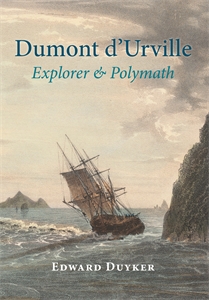Dumont d'Urville: Explorer & Polymath
Additional Information
- About the Book
-
Explorer Jules-Sébastien-César Dumont d'Urville (1790–1842) is sometimes called France's Captain Cook. Born less than a year after the beginning of the French Revolution, he lived through turbulent times. He was an erudite polymath: a maritime explorer fascinated by botany, entomology, ethnography and the diverse languages of the world. As a young ensign he was decorated for his pivotal part in France's acquisition of the famous Vénus de Milo.
D'Urville's voyages and writings meshed with an emergent French colonial impulse in the Pacific. In this magnificent biography Edward Duyker reveals that D'Urville had secret orders to search for the site for a potential French penal colony in Australia. He also effectively helped to precipitate pre-emptive British settlement on several parts of the Australian coast. D'Urville visited New Zealand in 1824, 1827 and 1840. This wide-ranging survey examines his scientific contribution, including the plants and animals he collected, and his conceptualisation of the peoples of the Pacific: it was he who first coined the terms Melanesia and Micronesia.
D'Urville helped to confirm the fate of the missing French explorer Lapérouse, took Charles X into exile after the Revolution of 1830, and crowned his navigational achievements with two pioneering Antarctic descents. Edward Duyker has used primary documents that have long been overlooked by other historians. He dispels many myths and errors about this daring explorer of the age of sail and offers his readers grand adventure and surprising drama and pathos.
- About the Author(s)
-
Edward Duyker, Author
Edward Duyker was born in Melbourne to a Dutch father and a Mauritian mother. He received his PhD from the University of Melbourne in 1981 before working as an intelligence officer with the Department of Defence. In 1984 he settled in Sydney as an independent historian, and also served as the honorary consul of the Republic of Mauritius in New South Wales 1996–2002.Edward Duyker has published 17 books, many dealing with early Australian, New Zealand and Pacific exploration and natural science. These include Citizen Labillardière (2003), a biography of the naturalist Jacques-Julien Houtou de Labillardière, which won the NSW Premier’s General History Prize in 2004; and François Péron (2006), which won the Frank Broeze Maritime History Prize in 2007. In 2000 Duyker was made a Chevalier de l’Ordre des Palmes Académiques by the French government. He was awarded the Centenary Medal by the Australian government in 2003 and the Medal of the Order of Australia in 2004. He is an honorary senior lecturer in the Department of French Studies at the University of Sydney. He is married with two sons and is now a grandfather.
- Reviews and Endorsements
-
- The author has brilliantly utilised those and other documents to record the important and fascinating life of this vitally important explorer who achieved so much.
—Baird Maritime - It is to the credit of Edward Duyker, an Australian historian of Dutch and Mauritian parentage, himself quite polyglot, to have written what presumably will remain for many years, if not decades, the definitive biography, in any language, of, in the words of at least one New Zealand-based book-review writer, France's Captain Cook. Reading this exhaustively researched, well written and handsomely printed and bound biography, one could forgive the French were they to describe Cook as “le Dumont d'Urville des Anglais.”
—Archives of Natural History - As usual, Duyker (Australian Catholic Univ.) has produced a thoroughly researched, chronological study of his subject. He has also produced an overly detailed, topically fragmented book. For those with patience and an interest in exploration and/or the history of biological sciences, this book is worth reading.
—R.E. Schreiber, Indiana University South Bend
- The author has brilliantly utilised those and other documents to record the important and fascinating life of this vitally important explorer who achieved so much.
- Supporting Resources
-










